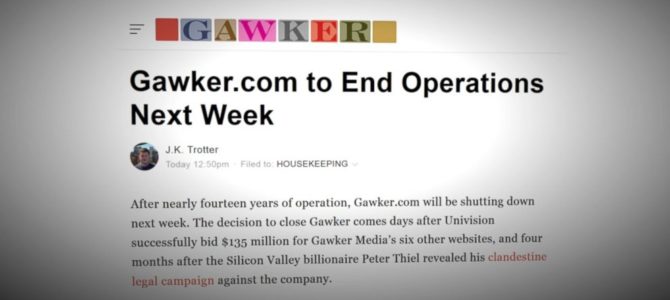University of Maine professor Michael J. Socolow has written a piece for The Washington Post today, titled “Gawker has been gone for a year. We’ve never needed it more than now.” Here’s a sample of his case for Gawker as a martyred savior of internet journalism:
Gawker is mostly defined as a guilty pleasure, an exercise in prurience by bored Web surfers and their millennial progeny. Yet its impact on American media remains undeniable. It launched the careers of an excellent set of young journalists, and it demonstrated a rare independence from corporate pressure, celebrity handlers and political operatives… But to place Gawker only in the context of the Web era is to miss its historical significance. Like PM (New York’s experimental newspaper in the 1940s), or the Berkeley Barb and other alternative press outlets in the 1960s, Gawker began as a crusade to save journalism. Like its alternative predecessors, Gawker challenged the processed wire copy and objective norms of standardized news content with pieces that could be opinionated, sensationalistic, and occasionally bizarre.
Socolow would perhaps have a different opinion of Gawker had he ever been a target of its writing, as so many were during its run. Gawker was a vile website dedicated to the destruction of human beings, especially those its founder, Nick Denton, disliked. It was particularly vile because of the randomness of its targets. Rather than focus on the rich and famous, it would routinely target and embarrass random people for no particular reason.
Do you remember when they doxed and outed a random executive, siding with his blackmailer, just for the clicks? Do you remember when they posted a video of a drunk college girl having sex in a bathroom, then dismissed her father’s heartfelt pleas to take it down? Do you remember when they interviewed Christine O’Donnell’s exes about how the sex was? Do you remember when their editor flippantly testified in open court that his threshold for not posting a sex tape was 4 years old?
Gawker was a site built to destroy lives. Its mission was to discover the worst moment in a person’s life, and then publicize it for profit. It was run by people who sought out life-destroying gossip about random citizens. It had no noble purpose – it was undone ultimately by a video of consensual sex with a former wrestling star, Hulk Hogan, that (whatever its moral questionability) was not some newsworthy event. (Shout-out to Peter Thiel for an excellent long game.) Gawker thrived on embarrassment and shame, seeking to demolish not just celebrities or politicians but average random people whose sins it would expose for traffic and commenters who gloried in its actions.
There’s something else to this WaPo oped defending Gawker after its well-earned legal demise: if you truly believe that Gawker’s approach was the salvation of journalism, a fulfillment of “Democracy Dies in Darkness”, then you accept a version of media that is ultimately heartless and cruel, hated by most of its readers even as it is beloved by the internet denizen who thrives on the destructive power of the mob. One of the reasons media is so despised today is that consumers do not trust the motives behind the stories they run. They believe media has become corrupted by its power and cannot be trusted to tell the truth, that they sensationalize and seek to destroy and attack random people who engage in wrongthink or wrong behavior. In this sense, Gawker wasn’t a monster – they were just ahead of the curve.








